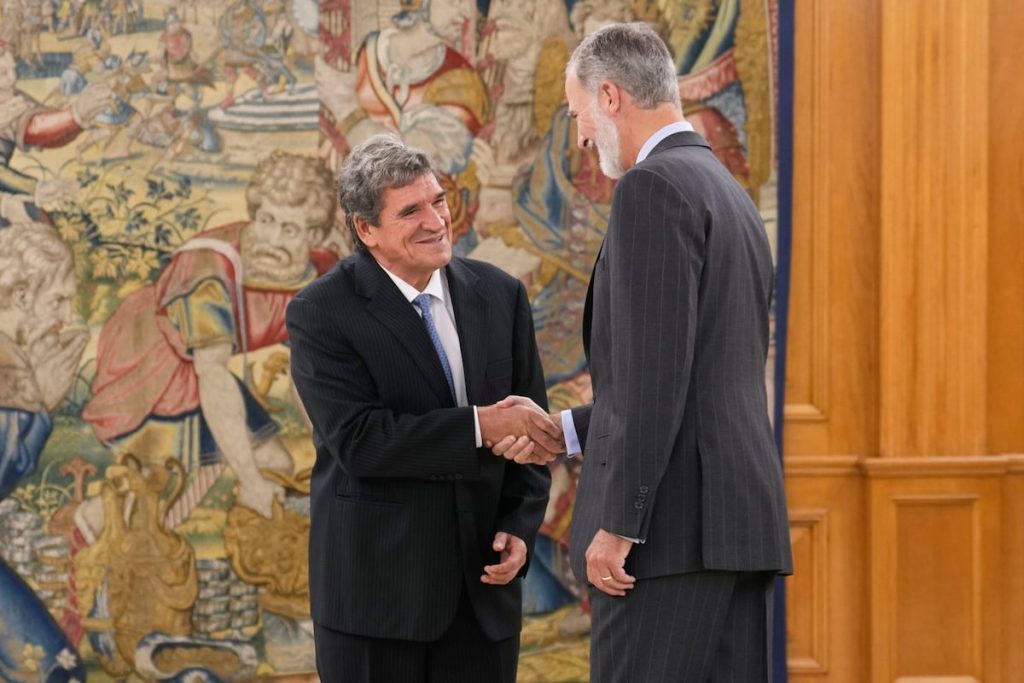José Luis Escrivá was sworn in as the new Governor of the Bank of Spain on Friday, returning to the institution after a career in public administration as a minister in two different portfolios under the presidency of Pedro Sánchez. In a statement on X (formerly Twitter), the former minister expressed his gratitude for the opportunity to return to the institution where he began his professional career, emphasizing that he will carry out his duties with the utmost responsibility. This marks his first public statement since his appointment, following a week of criticism from the opposition who believe that his transition from politics to the top banking supervision position compromises the institution’s independence.
Prior to his statement on social media, Escrivá attended the swearing-in ceremony before King Felipe VI, Prime Minister Pedro Sánchez, President of the Constitutional Court Cándido Conde Pumpido, and Minister of the Presidency Félix Bolaños, who served as the notary of the realm. Also present at the event was Óscar López, who assumed his new role as Minister for Digital Transition and Public Function. This is the same portfolio Escrivá held from November 2023 until the day before his appointment as Governor. Following the swearing-in ceremony, Escrivá participated in the handover with his successor, Óscar López, at the Ministry for Digital Transition headquarters. The event was attended by high-ranking government officials, including the first and third vice presidents María Jesús Montero and Teresa Ribera, amidst opposition criticism and the government’s declaration that Escrivá is the best candidate for the position. During the handover, Escrivá praised López for his role as Chief of Staff and thanked him for his work, expressing confidence in the future of the Ministry under López’s leadership.
Returning to the Bank of Spain, which he refers to as “his home,” marks a full circle in Escrivá’s career. He began as a technician in the institution and rose to become deputy director of the monetary and financial studies department and head of the monetary research unit. From 2014 to 2020, he served as President of the Fiscal Authority (Airef) and also as President of the Network of Independent Fiscal Institutions of the European Union from 2015 to 2019. Prior to this, Escrivá worked at the European Central Bank and the Bank for International Settlements. His extensive experience in financial institutions and public administration has prepared him for the challenges he will face as Governor of the Bank of Spain.
Escrivá’s appointment comes at a crucial time for the Spanish economy, which is grappling with the impact of the COVID-19 pandemic and ongoing structural challenges. As Governor, he will play a key role in overseeing the country’s financial system, ensuring stability and promoting economic growth. His experience in fiscal policy, both at the national and international level, will be invaluable in navigating these complex issues. Escrivá’s return to the Bank of Spain has been met with mixed reactions, with some praising his expertise and others expressing concerns about potential conflicts of interest given his political background.
In his new role, Escrivá will be tasked with overseeing the implementation of monetary policy, regulating financial institutions, and safeguarding the stability of the banking sector. He will also be responsible for representing Spain in international financial organizations and collaborating with other central banks to address global economic challenges. As a seasoned economist and financial expert, Escrivá is well-positioned to lead the Bank of Spain during these uncertain times. His commitment to upholding the institution’s independence and fulfilling its mandate will be crucial in maintaining the trust and confidence of the Spanish public and the international financial community. The challenges ahead may be formidable, but Escrivá’s dedication and experience equip him to navigate them successfully.















